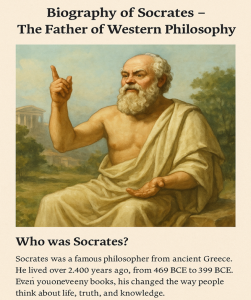The Man Who Taught the World to Think: A Simple Biography of Socrates

Have you ever met someone who answered your question with another question? It might not be very pleasant at first, but that’s exactly what one of the greatest thinkers in history did — not to confuse people, but to help them think deeper. That man was Socrates, and he lived more than 2,400 years ago in Ancient Greece.
Let’s dive into his story, told in simple words and a relatable way, so we can understand why Socrates still matters today.
Early Life of Socrates: A Humble Beginning
Socrates was born in 469 BCE in Athens, a powerful city in ancient Greece. His father was a sculptor, and his mother was a midwife. He didn’t grow up rich or famous. People said he was not attractive and didn’t dress fancy. He wore a simple robe, walked barefoot, and lived modestly.
But while he may not have looked special, his mind was full of powerful thoughts. He wasn’t interested in wealth, fame, or power. He wanted to know: What is the right way to live?
The Man of Questions
Socrates didn’t write books or give lectures in big halls. Instead, he walked around Athens and spoke with anyone who would talk to him — young, old, rich, poor. His favourite tool was a question.
He would ask things like:
- “What is justice?”
- “What does it mean to be wise?”
- “Is it better to be honest or popular?”
And every time someone answered, he would gently challenge it with more questions.
This way of learning through questioning is now called the Socratic Method, and it’s still used in classrooms and law schools today. It helps people think deeply and discover the truth for themselves.
What Did Socrates Believe?
Here are some of his most powerful beliefs:
- “Know thyself.” He believed self-understanding is the beginning of wisdom.
- Truth matters more than comfort. Even if the truth is hard, we should face it.
- We do wrong because we don’t know better. He thought people do bad things not because they are evil, but because they are confused about what is truly good.
- A good life is better than a long life. He cared more about living honestly and wisely than about living safely or comfortably.
He also didn’t believe in blindly following traditions or what society said. He encouraged people to think for themselves.
A Teacher Without a Book
Socrates never wrote a single word, but his student Plato wrote down many of their conversations. We might not know who Socrates was if it weren’t for Plato. Another great thinker, Aristotle, was Plato’s student. So, Socrates started a chain of deep thinkers who shaped the entire Western world.
Trial and Death: The Price of Truth
As Socrates became more famous, many powerful people started to dislike him. They felt threatened by his questions, especially because he made them look foolish in public.
In 399 BCE, he was arrested and put on trial. The charges were:
- Corrupting the minds of the youth
- Disrespecting the gods of Athens
He could have saved his life by begging for mercy or agreeing to stop questioning people. But Socrates refused. He said it was his duty to question and help people think.
He was sentenced to death and drank a cup of poison called hemlock, surrounded by his students and friends.
He died in peace, knowing he had stayed true to his beliefs.
Why Socrates Still Inspires Us
Even after thousands of years, Socrates teaches us valuable lessons:
- Always be curious.
- Ask questions instead of assuming answers.
- Stand by the truth, even when it’s hard.
- True wisdom starts with knowing you don’t know everything.
He reminds us that thinking for ourselves and living an honest life are the real signs of greatness.
Socrates may have lived in ancient times, but his thoughts are more relevant than ever. In a world full of noise, fast opinions, and shallow information, he shows us the power of slowing down and asking, “Why?”
If you’ve ever asked, “What’s the purpose of my life?” or “Am I doing the right thing?” — you’re already walking in Socrates’ footsteps.
So next time someone answers your question with another question, smile — you just met a little piece of Socrates.